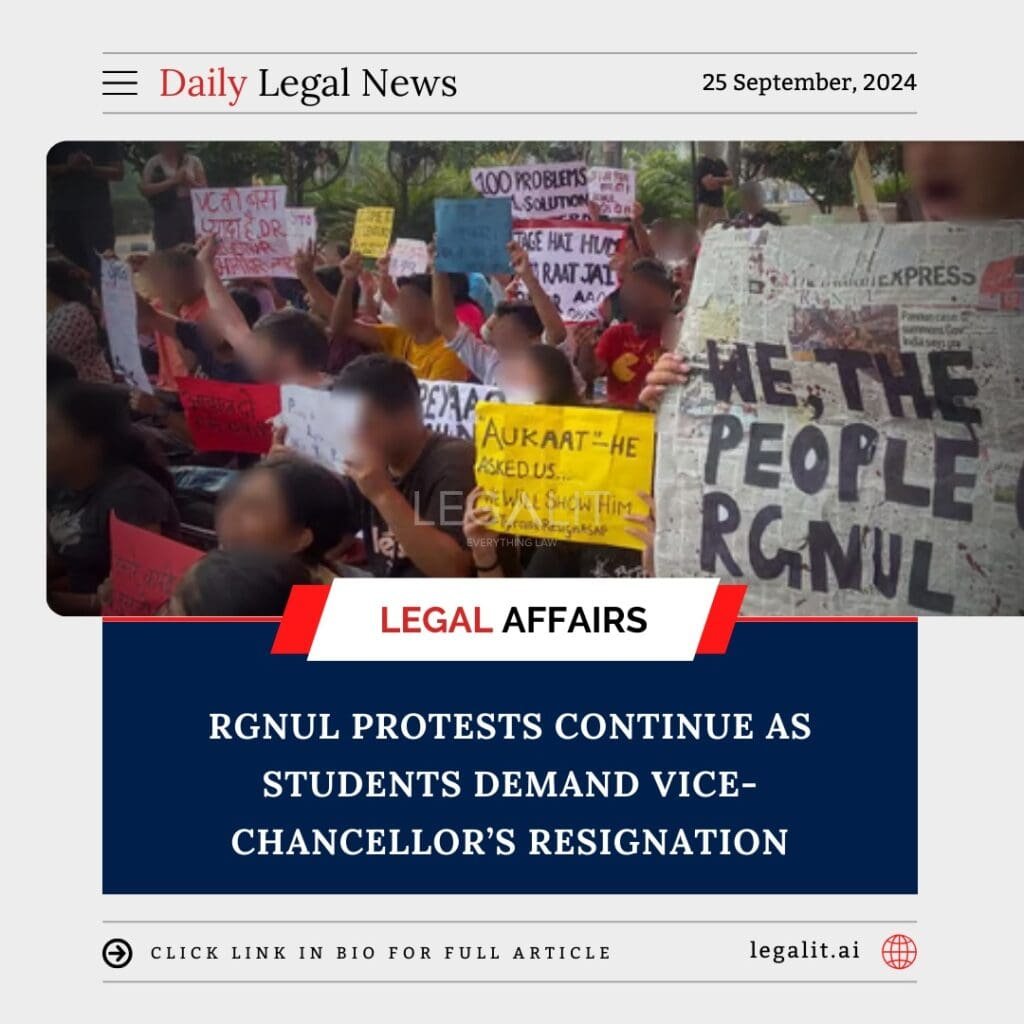
The protests at the Rajiv Gandhi National University of Law (RGNUL) show no signs of abating as students continue to demand the resignation of Vice-Chancellor Dr. Anand Pawar. In a bold move, the students have formally written to the Chancellor, Governor of Punjab Banwarilal Purohit, calling for immediate action against the Vice-Chancellor, citing a range of issues including mismanagement and a lack of transparency in the administration.
1. Background of the Protests
The protests began when a series of concerns regarding the administration’s behavior, policies, and overall governance came to light. Students alleged that the Vice-Chancellor’s leadership had created an oppressive environment that stifled academic freedom and discouraged student participation in decision-making. The straw that broke the camel’s back appears to have been the Vice-Chancellor’s visit to the girls’ hostel, which sparked widespread controversy and led to calls for his resignation.
2. Hostel Visit Controversy
One of the main triggers for the protests was the Vice-Chancellor’s visit to the girls’ hostel, which many students found intrusive and inappropriate. The students claim that the visit violated their privacy and was a blatant display of the administration’s lack of respect for boundaries. This incident, coupled with other grievances about poor infrastructure, insufficient student representation, and arbitrary administrative decisions, added fuel to the protests.
3. Students’ Letter to the Chancellor
In their letter to the Chancellor, the students outlined a litany of complaints against Dr. Anand Pawar, urging the Chancellor to intervene and replace him with someone who can restore trust in the institution. The letter accused the Vice-Chancellor of failing to address student concerns adequately and fostering an environment that discourages dialogue between the administration and the student body. The letter further criticized his leadership style, which they described as authoritarian and out of touch with the needs of the students.
The students have made it clear that they will not back down until their demands are met. They are pushing for reforms that will allow for greater student participation in university governance, as well as accountability measures for the administration.
4. Continued Protests and Support
The protests have now entered their second week, with students staging sit-ins, marches, and demonstrations on campus. The situation has garnered support from alumni and other student bodies across the country, who have voiced solidarity with the protesting students. Social media platforms have been flooded with messages of support, with the hashtag #RGNULProtests gaining traction.
Many students are also demanding an overhaul of the administration and a review of the policies that affect student life on campus. They are particularly concerned about the lack of mental health support, the poor condition of campus facilities, and what they perceive as an unresponsive administration.
5. University’s Response
While the university administration has not yet issued a formal statement addressing the students’ letter to the Chancellor, sources suggest that they are aware of the protests and the growing discontent among the student body. However, no concrete steps have been taken so far to resolve the situation or engage in meaningful dialogue with the protesting students.
There are fears that if the administration continues to ignore the students’ demands, the protests could escalate, potentially disrupting academic activities on campus. Students have expressed their willingness to continue the protests until they see tangible changes in the way the university is run.
6. Impact on the Academic Environment
The ongoing unrest at RGNUL is already having a ripple effect on the academic atmosphere. Classes and other academic activities have been disrupted as students focus on the protest. With exams approaching, there is growing concern that the standoff between students and the administration could affect the academic calendar.
Furthermore, the protest is shedding light on larger issues of governance and student welfare in Indian universities. Many are calling for nationwide reforms to ensure that students’ voices are heard and that university administrations are held accountable for their actions.
7. What Lies Ahead
The protests at RGNUL are a test of student power and administrative response. The students’ decision to involve the Chancellor has brought the issue to the highest level of authority, and how the Chancellor responds will determine the future of the movement.
For now, the students are steadfast in their demands, and the protests are likely to continue unless the administration addresses their concerns. If the Chancellor intervenes and takes action, it could mark a turning point not only for RGNUL but also for student-administration relations across Indian universities.
The RGNUL protests highlight growing tensions between students and university administrations across the country, with students demanding greater accountability, transparency, and a voice in the governance of their institutions. All eyes are now on the Chancellor’s response to the students’ call for action.